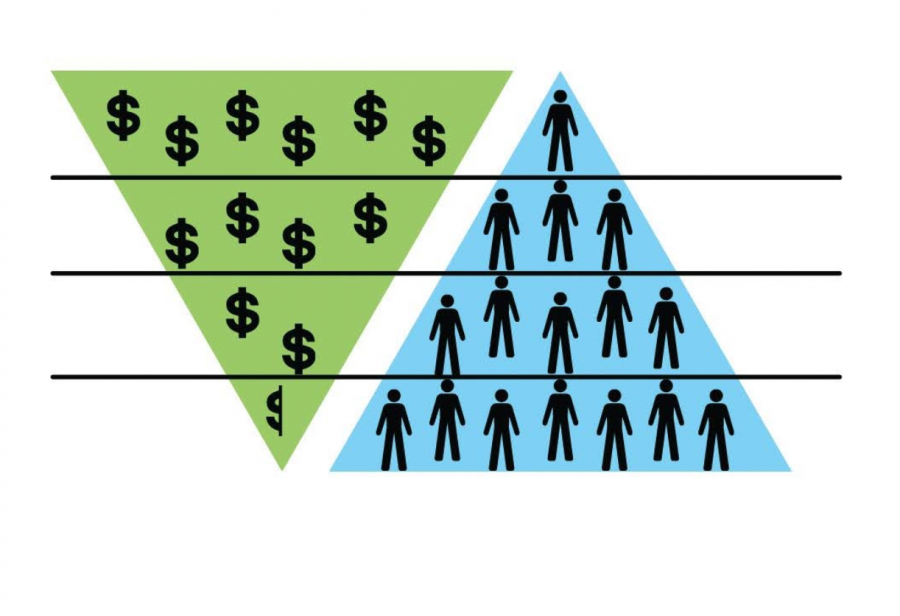Deconstructing taboos: Pyramid schemes and capitalism
“Hey, Isabelle! Have you ever thought about making an extra income from your phone? Would you like some more info?” Most people with a social media presence have received similar direct messages trying to entice them into a multi-level marketing company (MLM) better known as a legal pyramid scheme.
When asked what people do in such a circumstance, many will explain that they ignore the message and block the sender, or something similar. In essence, they know better than to participate in what is commonly perceived as a scam.
The term “pyramid scheme” comes from a form of investment, now illicit, where people are asked to recruit new investors for a commission or return on those investments. This practice is repeated until no longer sustainable and the company collapses. The monetary reward structure resembles a pyramid, where the majority of the company’s investors receive little to no returns on investments while a small number of people at the top receive the majority of the investment capital. That in-between receive graduated compensation depending on what level of the pyramid they are on, and the only way to advance is to corral more low-level investors into the company to exploit. The whole system relies on exploiting others to make your way to the top.
This hierarchical structure, where those at the top make the most money and those at the bottom make the least, was made illegal by the Federal Trade Commission (FTC) because they promise a return on investment that is impossible in the structure in which they run. MLMs are legal singularly because they run that structure over a business model, where even the lowest workers can work hard enough to make sales for commission for the company, on top of bringing in investors.
The FTC cautions people on enlisting in MLMs without first determining if the lifestyle that accompanies it is palatable. They warn that MLMs are highly time-consuming, sometimes having largely negative effects on family, friends and love lives and lacking financial security. Pyramid schemes and MLMs are heavily monitored and restricted because of their reliance on exploitation and lack of financial sustainability for all involved. The federal government and the average citizen know the danger that lies in such practices; however, they are unable to recognize it in their own society.
Capitalism, currently, is a pyramid scheme at worst and an MLM at best. As universities around the world are approaching another graduation season, releasing thousands of new workers into society, these individuals should understand that they are about to enter, level-one, into the longest-lasting pyramid scheme to exist.
At its theoretical conception, capitalism is a system where the means of industry and economics are owned privately, rather than by the government. Adam Smith, widely regarded as the first theorist to conceptualize a capitalist structure said of it, “every man, as long as he does not violate the laws of justice”
This free-spirited perspective on capitalism has since been perverted by greed that infringes upon those “laws of justice” in the exploitation of individuals in the name of pursuing personal profit.
The International Monetary Fund posits interesting hypocrisy in the system as they write, “Economic growth under capitalism may have far surpassed that of other economic systems, but inequality remains one of its most controversial attributes.”
While the numbers suggest that the economy flourishes, that grand economy only benefits individuals who are already at the top as their scraps are left to fall to those beneath them in socioeconomic status. This is the principle behind trickle-down economics, a nearly 50-year-long practice that’s efficacy has been debunked multiple times over.
It relies on people at the top using their abundance of capital to stimulate the economy by creating more jobs and giving back to society. But the practical application results in money hoarding by the socioeconomically privileged and graduated levels of begging by those below them, depending on the level of the pyramid they are on.
The reality is that those who advance past the preliminary levels of begging for scraps can only do so unethically, as any advancement under our current system of capitalism requires the exploitation of those beneath to provide their product and service at what is most likely an unlivable wage.
This will remain true until the majority commits to reforming the system of economics as it exists.
Debate will always exist between reformists and revolutionaries but at the very least, there can be a commitment to conscious capitalism.
In 2019, the university hosted a discussion with alumni and students on the topic focusing on shifting the current social goals of capitalism away from profit and toward a higher purpose in a practice referred to as conscious capitalism.
On the practice, practitioner in residence at the university Al Bhatt said, “Conscious capitalism takes into account social, cultural, and environmental wellbeing, and enables people to make a difference.”
Without an ideological shift in how capitalism is valued and practiced in society, it will eventually go the way of all pyramid schemes, as they are unsustainable, and collapse.

Isabelle Hajek is a senior at the University of New Haven majoring in psychology with a concentration in forensics and a double minor in criminal justice...




